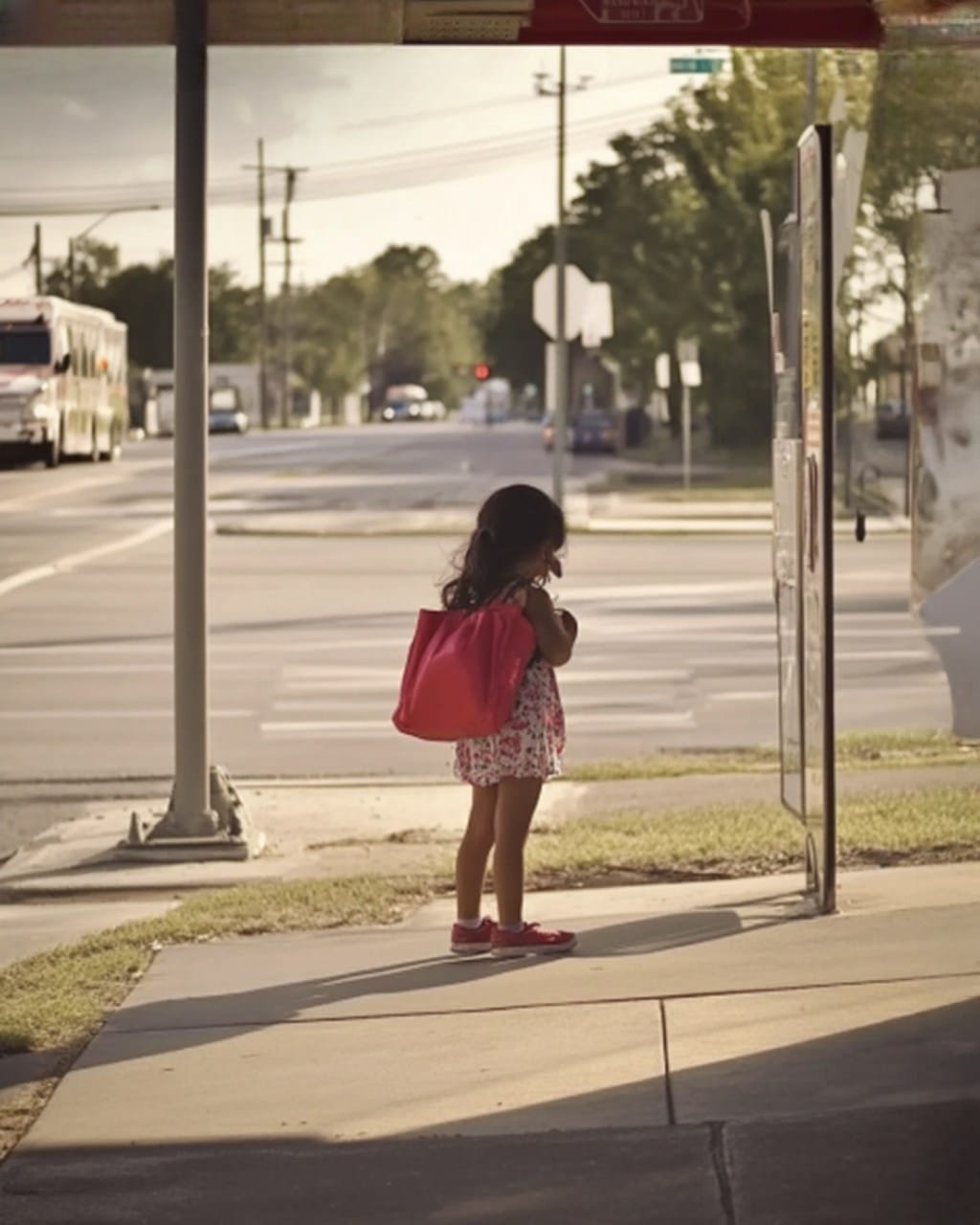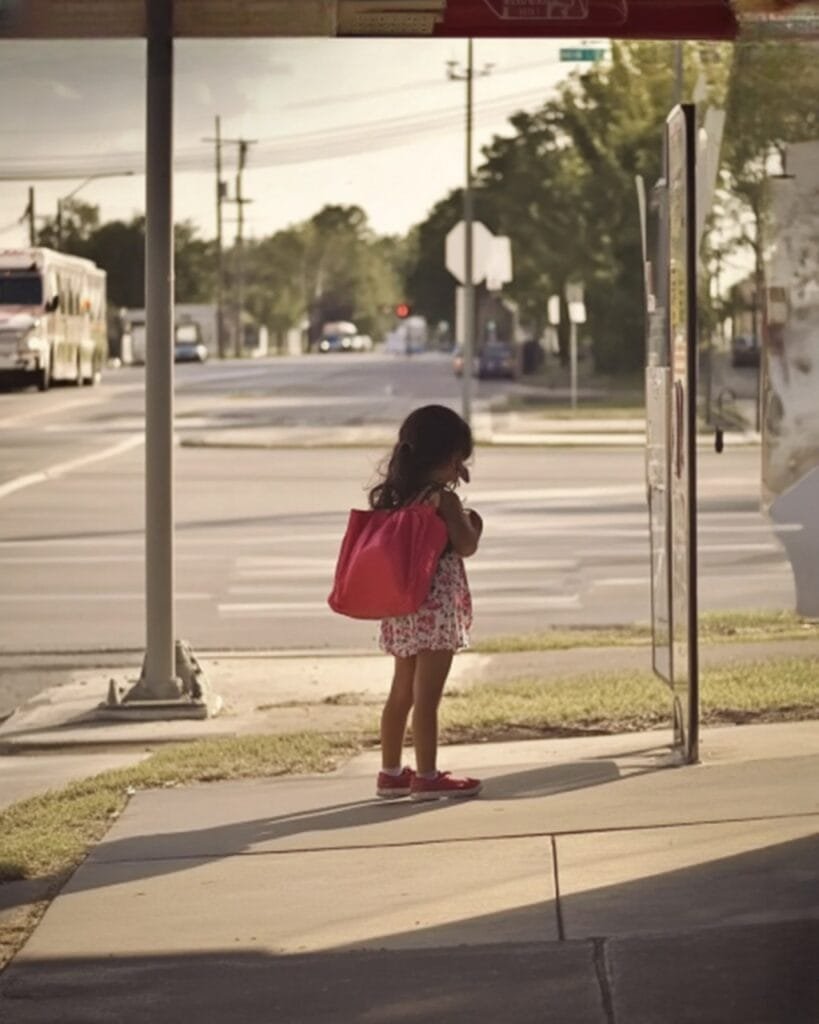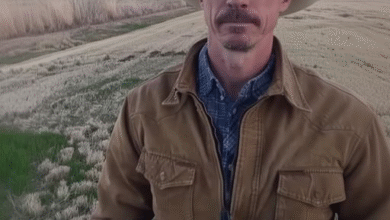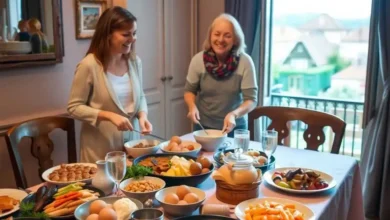The Red Bag: A Story of Hope, Loss, and Love.

When I moved into this quiet neighborhood, I thought I was finally catching a break. Thirty-two, single, and ready for a fresh start.
After eight years working in a chaotic newsroom—where breaking news collided with ringing phones, furious typing, and a constant hum of anxiety—the silence here wrapped around me like a healing blanket I didn’t realize I needed.

The street was lined with old maple trees, their silvery-green leaves whispering with the slightest breeze. The houses stood like quiet storytellers—some with peeling paint, others with neat flower boxes overflowing with late summer blooms.
Only a few cars passed each day. The only sounds were birdsong at dawn, rustling leaves, and the occasional distant bark of a dog. It was the kind of place where you could remember what peace felt like.
That first night, as I unpacked boxes filled with remnants of my old life, I saw her. A little girl standing alone at the bus stop right in front of my house.
She couldn’t have been more than eight years old. She wore a faded red coat that looked two sizes too big, and clutched a red bag to her chest like it was the most precious thing in the world. She didn’t seem lost—but she didn’t move either.
She just stood there, staring—not at me, but toward my house. Her expression was distant, weighted with something no child her age should carry.
I figured she was waiting for someone and didn’t think much of it.
But the next night, there she was again. Same time. Same spot. Same red bag. Still as a statue.
By the third night, my curiosity had turned into something else—a kind of quiet urgency. I paced around the house like a reporter chasing a story. I found myself drawn to the window, peeking out discreetly.
There she was. Again.
— “Alright, Samantha,” I muttered to myself. “Just ask if she’s okay.”
I stepped onto the porch. The wood creaked beneath me. But before I could speak, she turned and ran—fluid, fast, and silent. The red bag bounced on her back like a warning flag.
I stood frozen, watching her vanish into the dusk like a ghost that had chosen mystery over explanation.
The next morning began like any other. Pale sunlight filtered into the kitchen. I was halfway through a soggy bowl of cereal when I noticed something outside.
I opened the front door—and there it was. The red bag. Sitting quietly on my doorstep like it had been left with purpose.
I just stared for a moment. The strap was worn, the fabric faded, patched up in places with careful stitches. I picked it up, surprised by its weight.
— “Why is her bag here?” I whispered, scanning the street.
Inside the bag, I found the most delicate, handmade toys: miniature houses crafted from bottle caps, cloth dolls sewn from scraps, and tiny cars built from wire and buttons. Each piece was unique—imperfect and beautiful.
At the bottom, folded neatly, was a worn piece of paper. The handwriting was uneven, childlike, and trembling:
“My name is Libbie. I make these toys to pay for my grandma’s medicine. She’s very sick. My mom and dad died in a car crash three months ago. Please, if you can, buy them. Thank you.”
My eyes filled with tears. I pictured her, standing there every night, her red bag full of hope—not just waiting for a buyer, but for someone to notice. To care.
I grabbed my wallet and stuffed every bill I had into the bag. Not as a purchase, but as an act of connection. I gently removed the toys and laid them out on the kitchen table. In the morning light, they shimmered with quiet resilience.
But this… this was just the beginning of Libbie’s story—and mine.
That afternoon, I waited.
Then I heard footsteps in the yard. I peeked out. There she was—crouched by my door like a shy forest creature. Her oversized pink sweater made her look even smaller.
— “Hi,” I called gently, stepping outside slowly. “It’s okay. You don’t have to run this time.”
Her head snapped up, eyes wide with fear—deeper than any child should know. She looked like she might bolt.
— “Wait,” I said, raising my hands in a calm gesture. “I just want to talk. Don’t be scared.”
Her eyes shifted between the bag in her hands and my face. She was trying to decide—am I safe?
— “I didn’t want to bother you,” she mumbled.
— “You’re not bothering me,” I said softly. “Come in. I have warm milk and cookies. Would you like that?”
Something shifted. Her tiny shoulders—so used to bearing the weight of the world—eased. She gave the smallest nod.
Inside, Libbie sat at my kitchen table, almost disappearing into the oversized chair. She held the mug with both hands, fingers curled tight around the warmth. Every bite of cookie was tentative, like she feared it might be her last.
— “Why didn’t you just knock instead of leaving the bag?” I asked.
She shrugged.
— “I saw you watching from the window. I thought you might be kind. But… sometimes people yell at me. They say I’m annoying when I try to sell the toys.”
— “Sweetheart,” I said without thinking.
Her head shot up. Her lip trembled.
— “My mom used to call me that,” she whispered, eyes glistening with unshed tears.
— “She sounds like she was amazing.”
Libbie nodded.
— “She was. My dad too. He’d walk me to the bus every morning. She’d wait there for us in the afternoon. I just… like being at the stop. It makes me feel like they’re still here.”
Her words pierced straight through me.
That day, something changed—not just between us, but within me.
A year later, everything was different.
I married my longtime boyfriend, Dave, and together, we adopted Libbie. She brought light into our lives. Her laughter filled the quiet. Her creativity painted joy into every room.
Her grandmother, Macy, lives with us now. With round-the-clock care, her treatments are covered. The fear is gone—replaced by a home built on love and stability.
Libbie is thriving. Back in school. Her backpack now holds books instead of worries. We even helped her build a website for her toys. People didn’t just buy crafts—they bought the story. Each toy became a symbol of survival and hope.
Every cent goes toward her grandma’s care. Not out of desperation—but out of love.
Sometimes, I still find her at the bus stop, holding a newer red bag.
— “Why do you still go?” I asked once.
She smiled.
— “It’s nice to remember the good things. But it’s even nicer knowing I can come home to you.”
And every time she says that, I think of the first night I saw her—a lonely little girl with a red bag, standing between memory and hope.
Some stories aren’t written.
They’re discovered—
One moment at a time.





